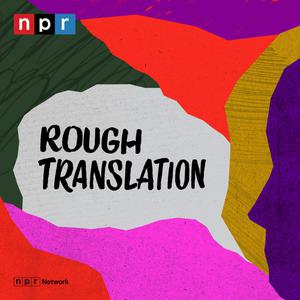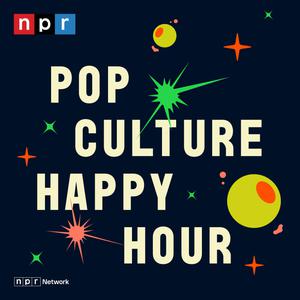
3620 Podcast
3620 Podcast
Annenberg School for Communication
- 36 minutes 40 secondsEpisode #69: Playback: Final Assignments
Today’s special episode presents final projects from COMM 317: Podcasting and the Politics of Sound. Three groups of undergrad communications majors at Penn take their first stab at audio production. Their assignment: the politics of sound, noise, and listening. We’ll hear from: KK Brooks, Marta Closas, Nick Seymour, and Lindsay Stanley (Part 1: Acoustic Resources?); Kylie Bronchik, Christina Griffith, Nate Morris, and David Ryslik (Part 2: Sound, Silence, and Control); and Ajibola Bodunrin, Lucy Ferry, Maggie Simon, and Jacob Stone (Part 3: Democratizing Sound)
Music credits:
“BREAKDANCE LESSON N. 1” by Kaytranada
“RandD” by Daedelus
“She Moves She” by Four Tet
“Dee” by Javelin12 June 2019, 4:46 pm - 18 minutes 4 secondsEpisode #68: Karaoke Verite
This episode explores karaoke – what is it, why do people do it, and what does it mean to them? All the music comes from live recordings of karaoke performances.
12 April 2018, 2:06 pm - 14 minutes 11 secondsEpisode #67: Penn Flutes: Community Ensemble
Thank you to Michele Kelly, director and founder of Penn Flutes, for fostering a community for flutists in the Philadelphia area. Many thanks to the members of Penn Flutes for their continued engagement in this dynamic community. All the music in this episode is from rehearsals and performances by Penn Flutes.
Carnival of the Animals – Finale (Camille Saint-Saëns)
Flower Duet from Lakmé (Léo Delibes)
March from The Love For Three Oranges (Sergei Prokofiev)
Ma Mere l’Oye – Laideronnette, Impératrice des pagodes (Maurice Ravel)
The Nutcracker – Arabian Dance – Coffee (Pyotr Ilyich Tchaikovsky)
Carnival of the Animals – Aviary (Camille Saint-Saëns)
North Star Overture (John O’Reilly)
Over the Rainbow (Harold Arlen)
Pink Panther Theme (Henry Mancini)
Carnival of the Animals – Finale (Camille Saint-Saëns)15 March 2018, 1:52 pm - 29 minutes 54 secondsEpisode #66: What can data deliver?
This episode features new producer Revati Prasad exploring the promises of data in the developing world – what data can do, who can access it, and who it serves.
Music by Sam Guilford: http://www.sam-guilford.com/#!sonic-sketches/crs8
Photo by Swaminathan
4 April 2016, 6:13 pm - Episode #65: Notes on Aspiration
Intro music: Song For Zula – Phosphorescent
Notes on Aspiration
Kevin Gotkin
[Kevin, a man’s voice:] A few months ago I moved to a new city and into a building that had once been a factory. Coming and going in the first few days, I would sometimes smell something sharp and fetid in the air. It had notes of rotten eggs or rotten cheese that seemed familiar but still strange. Soon I discovered this was not particular to my building, that the smell would breeze by me in small invisible clouds all around my new neighborhood. On long runs through sprawling campuses of oil refineries near my new home, there I would smell it too. But contrary to my guess that the smell was a byproduct of some industrial process, I learned the smell occurs naturally. It’s in the water, supposedly deposited, as one plaque in my neighborhood says, 570 million years ago. This sulphur spring was a trading post for some of the city’s earliest residents. It was, for decades in the mid 20th century, a popular destination to bottle sulphur water, which was believed to promote longevity, cure hangovers, and repel rats. City workers stocked it in office water coolers. Even the baseball stadium was named, until only recently, the Sulphur Dell.
I learned all this only a month after I read about widespread protest in Beirut, the capital of Lebanon. 20,000 tons of festering, summer-heated garbage had piled up in the streets of the city, a result of a closed landfill and the government’s inability to deliver basic city services. Fed up with the smell, but also with corruption and inefficiency, protesters took to the street wearing filter masks, chanting the two words that would spread online as fast as the stench itself: “You stink!”
[In Arabic, a man says “You stink and the smell of this country is shit.” Then, there are chants from the Beirut protests accompanied by the pangs of a drum keeping the beat. As the chants fade out, a song comes in: “Mysterieux Message” by Chapelier Fou. It has a thumping, walking beat with fluttering electronic notes that makes the narration sound curious, searching for something. It continues under the narration.]
[Kevin:] Stink, it seems to me, consumes our attention because it alerts us to fact that we’re breathing, something we know, of course, but often forget. Smelling something foul is like being told to take a deep breath by your doctor who has a cold stethoscope against your back, after which you can’t help but fixate on the fact that you’re always, constantly breathing. It’s like that game that all players are fated to lose because the only rule of the game is to avoid thinking about about the game.
[The song fades out.]
[Kevin:] The breath has become a focal point in recent mobilizations for justice in the U.S. On July 17th of 2014, New York City policer officers attempted to arrest Eric Garner, an unarmed black man they suspected of illegally selling cigarettes. One of the officers put his arms around Garner’s neck and pulled him to the ground from behind. While in the chokehold, he shouted “I can’t breathe” ten times before he lost consciousness and then died.
In the protests after Garner’s death, these words came to describe the experience of police terror and racial injustice that the #BlackLivesMatter movement was mobilizing around the country. Garner died from a literal chokehold, which came to signify larger ones: chokeholds on Black youth’s freedom to walk down a sidewalk without being assumed criminal, chokeholds on minorities’ access to education and health care, chokeholds on the mobility of America’s poor as a result of upward redistribution of wealth. Around the country, asserting “We can’t breathe” became a way of describing the struggle to keep up on a proverbial treadmill of charmed American life that, like a horizon, stays put no matter how fast you’re moving.
[A song fades up: “I Can’t Breathe” by Pussy Riot. It has harsh, metallic and electronic elements. In the background, it sounds like sirens are muted but warped and drawn out. Over them, a man re-voices the last words of Eric Garner’s life. “I told you the last time, please just leave me alone. Please! Please! Don’t touch me! Do not touch me! I can’t breathe! I can’t breathe! I can’t breathe! I can’t breathe! I can’t breathe! I can’t breathe! I can’t breathe! I can’t breathe! I can’t breathe!” Then, the song dissolves into an electronic drone.]
[Kevin:]The breath has often been an important feature of American protest. It takes a great deal of breath to shout at the top of your lungs, a kind of cry that communicates with more than just words. Protesters shouting and marching are often out of breath. And then, sometimes, there isn’t a choice. Peaceful activists since the murder of Michael Brown in August of 2014 have known the searing pain after law enforcement sprays mace into the air, what it feels like to be betrayed by your capacity to take a breath.
[A song fades up, from a YouTube video of four men singing a song that was often heard in Black Lives Matter protests around the U.S. The men sing with an acoustic guitar playing lightly underneath. “I can hear my brother crying ‘I can’t breathe.’ So now I’m in the struggle saying ‘I can’t leave.’ We callin’ out the violence of these racist police. And we ain’t gonna stop until [clap, clap] our people are free. We ain’t gonna stop until [clap, clap] our people are free.” The song fades out.]
[Kevin:] On March 12th of 1990, disability rights activists approached the Capitol Building in Washington DC. The Americans with Disabilities Act, a piece of legislation that would secure sweeping anti-ableist protections, had passed in the Senate but was having trouble getting through the House.
[Sounds from that day’s protest play. In call and response, the protester shout: “What do you want? ACCESS. When do you want it? NOW.”]
In a PBS retrospective, activist Michael Winter describes the start of what came to be an iconic action.
[Michael, a man’s voice:] The night before, they asked for volunteers to, you know, crawl up the steps, you know. And I thought – I thought – I thought it was a great idea. Some people were really against it. They thought that it would be really demeaning to see a bunch of disabled people crawling up steps, you know. But my feeling on it was that it was really demeaning the way the country was treating disabled people anyway. So why not let them see some, some reality? See what people have to do in order to get to the top of the building, you know?]
[Kevin:] A woman with dark hair in a wheelchair is wearing sunglasses and talking to a news camera.
[A woman’s voice, with cheers from the crowd underneath:] We’re gonna march until the Congress starts listening to us. They’re – they’re stalling the bill that’s gonna give us equal rights and we ju- aren’t asking for civil rights. We’re demanding them, and now!]
[Kevin:] At the foot of the 100 steps that led to the entrance of the Capitol, protesters got out of their wheelchairs and started to climb. Many worked to control their legs that would stiffen and chafe against each stair. They were flanked on all sides by people offering a steady hand and photographers capturing their grimaced faces. One woman, pulling herself backwards up each step, took a break, stretched her arms out on either side, her chest heaving.
[There are more sounds of the protests. “ADA now! ADA now! ADA now!”]
[Kevin:] At one point, the news cameras on the scene swarmed around one protester, an eight year-old girl with cerebral palsy who was ascending the stairs with a particular kind of fury. As she rested her chin on a step in between jerky advances, she became for many a symbol of the fierce commitment of the disability justice movement.
[There are ambient sounds of the footage from her crawl. One man shouts, “Come on Jennifer!” A woman says softly, “Take your time.” There are many camera clicks. Then, the girl shouts, “I’ll take all night if I have to!”]
[Kevin:] The Americans with Disabilities act passed soon after the Capitol Crawl. And what this protest displayed in ways that Congress couldn’t ignore, was how easy, how sinisterly easy it is to design the built environment such that some people are left literally at the curb. Americans with disabilities are still too often out of breath for no good reason, because they’re late to a meeting when a building’s wheelchair accessible entrance is hidden around back and rarely monitored. Because they’re struggling with a step at a shop front that could so quickly be turned into a ramp. Because they’re breathlessly explaining to people over and over again that the sea of depictions of disabled people is unjustified and untrue. These people short of breath are also short of justice.
[A song fades up. It consists of quick, plucked strings of a guitar and then soft, flowing electronic chords. It makes the narration sound curious but also a little sad. It fades out under the narration and then the sound of a person breathing in and out come in.]
[Kevin:] In the months after Eric Garner’s death, media artist Ian Alan Paul published a site that contains what he calls an “online poem.” Against a white background, to the sounds of a person inhaling and exhaling, lungs appear. In the warm, bloody hues of these lungs there are images of Eric Garner’s last moments of life. In text there are various questions.
[In between each question there is an inhale and an exhale.]
Whose breath is heard, and whose is not?
Whose breath is near, and whose is not?
Whose breath is stolen, and whose is not?
Whose breath endures, and whose does not?
[After the last question, there is a final breath and then a beat of silence.]
[Kevin:] It takes a great deal to lose awareness of the breath. An easy breath, like the smooth surface of an iPhone not yet cracked, is almost imperceptible. Until something jolts the breath out of its calm rhythm. In those moments, it’s easy to understand the breath in an ecology that links us to each other and to our surroundings. When the air we breathe gets stuffy or stinky or is in short supply, we experience something profound, something that reminds us of our shared reliance on that vital, immense store we call the sky.
[A song had faded up under the narration. It has no words, just slow and decided chords. It is both hopeful and sad.]
[Kevin:] It’s fascinating to me that the word “aspiration” has two meanings, one about breathing and one about desire. Perhaps they’re more connected than we might realize at first, because the extent to which individuals can freely aspire in and out of their bodies determines to some extent what they can aspire to. Collective desires for equity and justice begin with that simple cadence of our breaths that, if we’re lucky, we don’t notice at all.
[The song slowly fades.]
10 December 2015, 5:57 pm - 17 minutes 1 secondEpisode #64: Leaving Iran
This week, 3620 intern Percia Verlin interviews her mother about her experiences leaving Iran just before the Iranian Revolution and moving to the United States.
Music:
So Long – Fruit Bats
Hajme Khali – Kourosh
minute2 – melodium
America – West Side Story
Growing Up – Lullatone
I Set My Face to the Hillside – Tortoise
19 November 2015, 11:35 pm - 15 minutes 3 secondsEpisode #63: Poetry and Music of Al-Andalus, Part Two
“…despite all the tumult, and despite all of the uprisings and the wars and the many kings coming in left and right, this beautiful poetry not only was created there but it flourished. I guess its a testament to hope, in that people can still find the time, the energy and the inspiration to create something beautiful in such a dire and difficult situation, and that, I guess that for me is one of the most profound takeaways from this poetry.”
“I hope that audiences have a sense that even in very difficult times, people can still create things of beauty, things that have meaning and that last, and by writing this piece, I guess we’re honoring that, and in some way I hope that comes across.”
This week is the second episode of a two-part exploration of the poetry and music of al-Andalus. Produced by Jasmine Erdener, this episode features interviews with world-renowned composers Kareem Roustom and Kinan Abou-afach.
In the last episode we discussed the music and poetry of Andalusia, which originated in Islamic Spain, or Al-Andalus, during the 8th-15th centuries. After this period ended, the people who left Spain continued to sing these poems and play music in this style. Six centuries later, this poetry and this historical moment are still deeply resonant with many people in the Arab world.
Al-Bustan Seeds of Culture’s project “Words Adorned: Andalusian Poetry and Music” is made possible by the Pew Center for Arts & Heritage. More info at: http://albustanseeds.org/digital/wordsadorned/. This podcast is developed with WPEB Radio and Scribe Video Center.
Music: Drub Al-Hayat / The Paths Of Life, featuring Sonia M’Barek from the 2014 album Rihla: Live In Philadelphia produced by Al-Bustan
Photo by Glenna Barlow: https://www.flickr.com/photos/rose_des_vents/
[podlove-episode-web-player]3 November 2015, 9:55 am - 14 minutes 56 secondsEpisode #62: Poetry and Music of Al-Andalus, Part One
Check out this week’s episode for the first of a two part exploration of the poetry and music of al-Andalus. Produced by Jasmine Erdener, this episode features interviews and a music demonstration with Al-Bustan Seeds of Culture’s Music Director Hanna Khoury and Literary Scholar/Project Manager Ahmad Almallah.
Islamic Spain, or Al-Andalus, during the 8th-15th centuries, saw an incredible flowering of the arts and music. Poets began breaking away from classical Arabic poetry, and invented an entirely new style of poetry that was usually sung and set to music. After the Spanish reconquest of the country, followed by the Spanish Inquisition, this period ended. But in the hearts and minds of the people who left Spain, and who brought this music and poetry throughout North Africa and the Middle East, it remained a link to what was seen as the lost paradise and Golden Age of Andalusia.
Al-Bustan Seeds of Culture’s project “Words Adorned: Andalusian Poetry and Music” is made possible by the Pew Center for Arts & Heritage. More info at: http://albustanseeds.org/digital/wordsadorned/. This podcast is developed with WPEB Radio and Scribe Video Center.
Music: Ili T’adda Wa Fat / That Which Has Passed, featuring Sonia M’Barek from the 2014 album Rihla: Live In Philadelphia produced by Al-Bustan
Photo by Glenna Barlow: https://www.flickr.com/photos/rose_des_vents/
[sc_embed_player_template1 fileurl=”https://docs.google.com/uc?authuser=0&id=0BzLvXj0_YaLda2VzVG5SNGViRXc&type=.mp3″]
27 October 2015, 7:58 pm - Episode #61: Serial and the Possibilities of Podcasting
This week on 3620, we have the privilege of sharing a work in progress. Veteran producers and former 3620 hosts Kevin Gotkin and Corrina Laughlin join with new producer Mariam Durrani to have a conversation about the podcast phenomenon known as Serial. But really this episode is about everything that we’re trying to do here at 3620: it’s about sound scholarship, the blurred lines between knowledge production and entertainment in the digital age, affect, voice, and the types of work that new media formats can and cannot accomplish. What you’ll hear is a draft of an audio essay that Kevin, Corrina, and Mariam will be publishing along with a special issue of the journal American Anthropologist, which is truly an incredible feat. Take a listen, I think you’re gonna like it.
22 April 2015, 2:38 pm - Episode #60: Summer Teaching
Just in time for summer, producer Holli Seitz continues her series on communication pedagogy with an examination of teaching during the summer term. Through interviews with Penn Center for Teaching and Learning Senior Associate Director Cathy Turner and Annenberg doctoral students Andrew Daniller, Kevin Gotkin, and Nicholas Gilewicz, Holli explores the challenges and joys of small classes, long days, and short terms. This episode offers practical advice for the novice summer instructor on structuring a class, creating assignments, and enjoying the process.
“Summer Madness” – Kool and the Gang [intro and throughout]“Summer Breeze” – Seals and Crofts [closing]
15 April 2015, 12:16 am - More Episodes? Get the App
Your feedback is valuable to us. Should you encounter any bugs, glitches, lack of functionality or other problems, please email us on [email protected] or join Moon.FM Telegram Group where you can talk directly to the dev team who are happy to answer any queries.
 Intercepted with Jeremy Scahill
Intercepted with Jeremy Scahill
 Up First
Up First
 Rough Translation
Rough Translation
 Pop Culture Happy Hour
Pop Culture Happy Hour
 Planet Money
Planet Money
 On the Media
On the Media